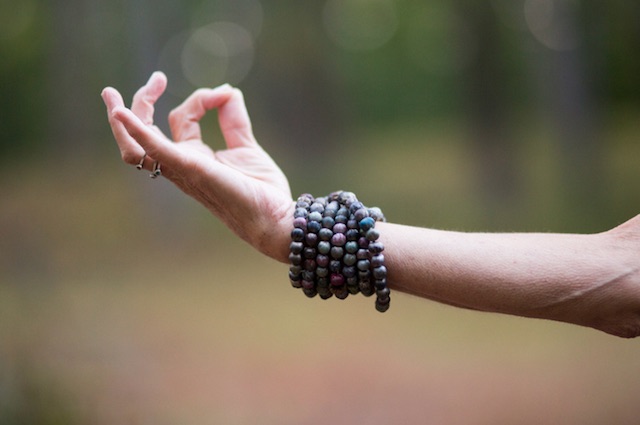Google my name, and you will find a collection of articles dating back to 2011, one of them titled, “Why does my root chakra want $250,000?”
I cringe at this article. I wrote it at age 25, newly graduated from yoga teacher training and enchanted with the rituals and symbols of a society I knew little about. I wore mala beads I never used for meditation, collected deity sculptures I placed in the wrong parts of my home, and had Sanskrit jewelry I couldn’t read.
I’d spent 17 years of my life in a Presbyterian church in Upper St. Clair, Pennsylvania, spent 200 hours learning about yoga, and felt I owned both of these experiences equally.
I was a walking example of cultural appropriation. I was part of a mainstream culture that adopted symbols of a minority culture while remaining largely ignorant to the original intention, context, and value of those symbols. I had no permission from, paid no reverence to, and did not associate with any members of that minority culture.
Yes, judge me. I judge myself with the only caveat being that I was young and following the examples of older, Midwestern, Christian white women whom I idolized. Not all of them were simply appropriating another culture. But many were. And I was. I try not to anymore. This is my litmus test:
1. Do I believe this teaching in my heart of hearts?
It has taken me years to be comfortable admitting publicly that I do not believe in the chakras. I think it’s fine that other people do, the same as I think it’s fine that other people believe in the virgin birth. I think the chakra system is an interesting philosophy, and I love to compare and contrast how aspects of Western culture mimic these same themes.
2. Do I understand its origins and applications?
“Ganesh is the remover of obstacles,” I used to say. I’d tell a story about Ganesh as plainly as I was telling a story about my sister. But those were not my stories to tell—at least, not in that way. He was, to me, a cute elephant god whose image held less emotional baggage than an image of Jesus on the cross.
3. Do I embody the lifestyle required by this teaching?
I consider myself more Buddhist than any other form of spirituality. I study a tremendous amount of Buddhist philosophy, and I practice the Buddhist meditation of Tonglen. But I am not ready to follow the Five Precepts. I do not regularly participate in Sangha at a Buddhist center. By any definition I can accept, I do not embody a Buddhist lifestyle.
So, what exactly can I teach? Am I allowed to teach yoga at all? Or is any approach I take to yoga and meditation practice innately appropriative?
I think there is a way we can teach that honors the cultures influencing yoga—we can do it without simply borrowing their highlights as a way to seem more appealing.
Here are three steps we can all take:
1. We should be honest about our own practices in relation to this teaching.
What does your personal practice truly entail? I share with my students how my Tonglen meditation practice has deeply influenced my life, and I invite them to experience it for themselves. We can all share from our own experience honestly, but we cannot share someone else’s experience and pass it off as our own.
2. We should study and educate ourselves on where this teaching comes from and why it matters today.
What if we want to share information that isn’t part of our personal practice? Let’s educate ourselves first on where the practice comes from. Let’s teach the topic from an academic perspective, rather than a spiritual one.
3. We should refer students to places where they can find authentic representations of this teaching.
What if students have a spiritual experience and want to dive further into a practice that we aren’t qualified to teach? We can be prepared to say, “I am not your best teacher on this topic.” We can encourage them to seek authentic sources of information, either directly from source materials or from teachers who do embody that practice.
~
Author: Bethany Eanes
Image: used with permission, via Brittany White Photography
Apprentice Editor: Amanda Follett Hosgood // Editor: Yoli Ramazzina
Copy editor: Nicole Cameron
Social editor: Lindsey Block


 Share on bsky
Share on bsky





Read 1 comment and reply